
Mammillaria is one of the largest genera in the cactus family (Cactaceae), with currently 200 known species and varieties recognized. Most of the mammillarias are native to Mexico, but some come from the southwest United States, the Caribbean, Colombia, Venezuela, Guatemala and Honduras. The common name "pincushion cactus" refers to this and the closely related genus Escobaria.

Fishhook cactus is a common name for any hook-spined species of the genera Mammillaria, Echinomastus or Sclerocactus. They are small cacti, usually growing up to 6-7 inches (20 cm) high, and are shaped similar to a barrel cactus. They are not to be confused with the fishhook barrel cactus of the Sonoran and Chihuahuan Deserts. The Fishhook cactus is a large category of around 150 species.

Mammillaria glochidiata is a species of plant in the family Cactaceae. It is endemic to Mexico. Its natural habitat is hot deserts. It was classed as Extinct in the wild but since 2013, it has been classed as Critically Endangered by the IUCN Red List.

Mammillaria guillauminiana is a species of plant in the family Cactaceae.

Mammillaria marcosii is a species of plant in the family Cactaceae. It is endemic to Mexico. Its natural habitat is hot deserts.

Mammillaria stella-de-tacubaya is a species of plant in the family Cactaceae.
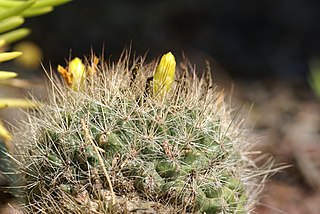
Mammillaria weingartiana is a species of plant in the family Cactaceae. It is endemic to Nuevo León state, Mexico.

Mammillaria elongata, the gold lace cactus or ladyfinger cactus, is a species of flowering plant in the family Cactaceae, native to central Mexico. Growing to 15 cm (6 in) tall by 30 cm (12 in) wide, it consists of densely packed clusters of elongated oval stems, covered in harmless yellow or brown spines, and in spring producing white or yellow flowers. It is among the commonest and most variable of its genus in nature, and is a popular subject for cultivation. It has gained the Royal Horticultural Society's Award of Garden Merit.

Mammillaria spinosissima, also known as the spiny pincushion cactus, is a species of flowering plant in the cactus family Cactaceae, endemic to the central Mexican states of Guerrero and Morelos, where they grow at elevations of approximately 1,600 to 1,900 metres. The species was described in 1838 by James Forbes, gardener of the Duke of Bedford. Botanist David Hunt collected a specimen in 1971, when he located one near Sierra de Tepoztlan, Mexico.

Mammillaria tetrancistra is a species of fishhook cactus known by the common name common fishhook cactus. It is native to the Mojave and Sonoran Deserts of northern Mexico and the southwestern United States, where it grows in a variety of desert habitat types.
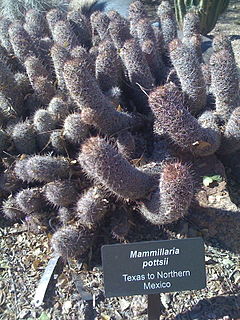
Mammillaria pottsii, also known as fox-tail cactus or rat-tail nipple cactus, is a species of flowering plant in the family Cactaceae. It was first described by Scheer ex Salm-Dyck, Cact. Hort. 1849: 104 (1850) According to the United Nations Environment Programme, M. leona is a synonym for M. pottsii.

Mammillaria grahamii is a species of cactus also known by the name Graham's nipple cactus.

Mammillaria glassii is a species of cactus in the subfamily Cactoideae. It is a small, clumping cactus with "fluffy white spines." M. glassii is native to Mexico in the states of Coahuila and Nuevo León.
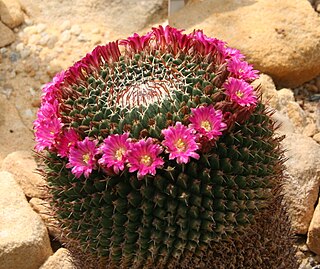
Mammillaria mystax is a species of cactus in the subfamily Cactoideae. It is endemic to the Mexican states of Hidalgo, Oaxaca and central Puebla.
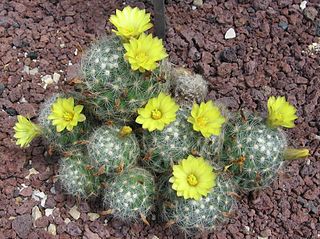
Mammillaria baumii is a species of cactus in the subfamily Cactoideae. It is endemic to Mexico. It was named for botanist Hugo Baum.

Mammillaria supertexta is a species of cacti in the subtribe Cactinae. It is native to Oaxaca, Mexico.

Mammillaria heyderi is a species of cactus in the subtribe Cactinae. It is endemic to Sonora and Chihuahua in Mexico and Arizona and Texas in the United States.
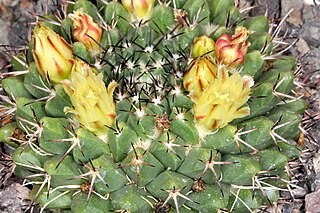
Mammillaria karwinskiana is a species of cacti in the subtribe Cactinae. It is native to Mexico.

Mammillaria haageana is a species of cacti in the subtribe Cactinae. It is native to Mexico, where it is found commonly, and is widespread throughout much of the country.
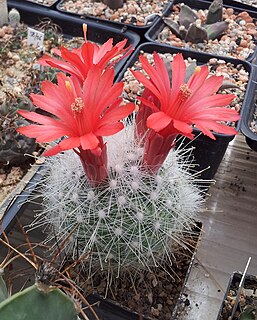
Mammillaria senilis is a species of cacti in the subtribe Cactinae. It is native to Mexico, where it is found in the states of Chihuahua, Durango, Jalisco, Nayarit, Sinaloa and in south Zacatecas.




















